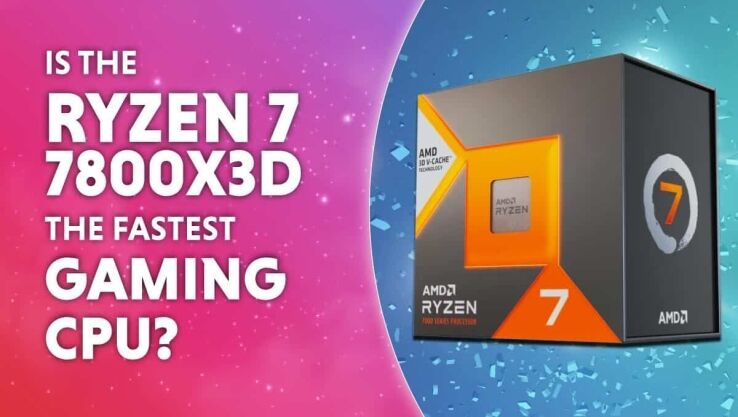Is the Ryzen 7 7800X3D the fastest gaming CPU?
Is the Ryzen 7 7800X3D the fastest gaming CPU?

WePC is reader-supported. When you buy through links on our site, we may earn an affiliate commission. Prices subject to change. Learn more
The Ryzen 7 7800X3D released on April 6th, 2023, is set to be the next addition to the Ryzen 7 lineup. This processor features AMD’s powerful 3D V-cache technology, which is known to improve gaming performance by incredible margins. So, we have to ask: Is the Ryzen 7 7800X3D the fastest gaming CPU?
Now Read: Best CPU for gaming 2023.
Is the Ryzen 7 7800X3D the fastest gaming CPU?
Unfortunately, the Ryzne 7 7800X3D is not considered the fastest gaming CPU available, it is, however, the best value for money X3D CPU you can buy.
Currently, the fastest gaming desktop processor is the Ryzen 9 7950X3D. This is the older brother of the Ryzen 7 7800X3D and is included in the same CPU lineup. The 7950X3D was released on February 28th.
We initially expected all three Ryzen 7000 X3D processors, the Ryzen 7 7800X3D, the Ryzen 9 7900X3D, and the Ryzen 9 7950X3D, to release together on February 28th. However, the 7800X3D’s release was pushed back to April.
The Ryzen 9 7950X3D shares many similarities with the 7800X3D, but is mostly an upgraded version of it.
It’s a 16-core, 32-thread processor with a maximum clock speed of 5.7GHz and an L3 cache size of 128 MB, meaning it beats the Ryzen 7 7800X3D in all the primary CPU specs. Or at least, it appears that way on the surface.
The performance gap between the two may not be as significant as you would be led to believe by this difference in specs.
The Ryzen 7 7800X3D specifications
Here are the specs for the upcoming Ryzen 7 processor.
- Core count: 8 (Multithreading enabled)
- Thread count: 16
- Boost clock: 5GHz
- L2 cache: 8MB – 1MB per core
- L3 cache: 96 MB – shared
- TDP: 120 watts
- iGPU: Radeon Graphics
- Socket: AM5
At first glance, these seem like fairly standard high-end specs. That is until you notice the incredible 96MB of L3 cache this processor boasts.
The cache is high-speed memory located on the CPU die, right next to the cores. More cache allows the cores to keep important data close, preventing them from having to access the much slower DRAM.
To put 96MBs into perspective, Intel’s current flagship, the Core i9-13900KS, has a 32MB L3 cache.
The 7800X3D’s “non-3D” equivalent, the Ryzen 7 7700X, also has a 32MB L3 cache, which means the 3D V-cache technology employed here by AMD allows this processor three times its standard cache size.
How does the 7800X3D compare to the 7950X3D?
The 7950X3D has two chiplets (CCDs) on the CPU die, each housing 8 cores. The first 8-core CCD has the V-cache upgrade (96MB of L3 cache) but runs a much lower maximum clock speed of about 5.25GHz due to V-cache’s temperature sensitivity demanding the need to keep heat generation low.
The second 8-core CCD features a standard Ryzen L3 cache (only 32MB), but the 8 cores heres can operate at the stated maximum of 5.7GHz.
All game-related processing on the 7950X3D is carried out on the first V-cache enhanced CCD. The cores on the 2nd CCD are parked, or put on hold.
That means, during gaming, the 7950X3D is effectively an 8-core, 16-thread processor with a maximum clock speed of 5.25GHz and an L3 cache size of 96MB.
And, as you’ve probably guessed already, these specs are remarkably close to those of the 7800X3D. The only difference is the 250MHz higher boost clock.
For gaming, The 7800X3D and 7950X3D (and even the 7900X3D) end up offering very similar performance.
It’s theorized that AMD pushed back the release of the 7800X3D purely because it would cannibalize sales of the 7950X3D, offering almost equivalent gaming performance at $250 lower.
Still, because the 1st CCD on the 7950X3D is running at a higher clock speed, this CPU is able to squeak out a win over the 7800X3D in terms of frames delivered, even if only by the slightest of margins.
Final words
To answer the question put forward in the title – No, the Ryzen 7 7800X3D is not the fastest gaming CPU. The fastest gaming CPU is the Ryzen 9 7950X3D, and it will likely continue to be that way at least until the next generation of Core and Ryzen processors release.
The 7800X3D is only slightly worse than the 7950X3D. And if we’re being realistic, the performance difference in gaming is negligible. But, the 7800X3D does cost $250 less, putting the 7950X3D’s value as a gaming processor into question.